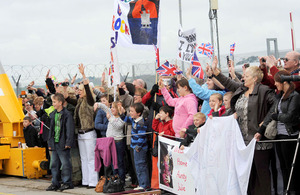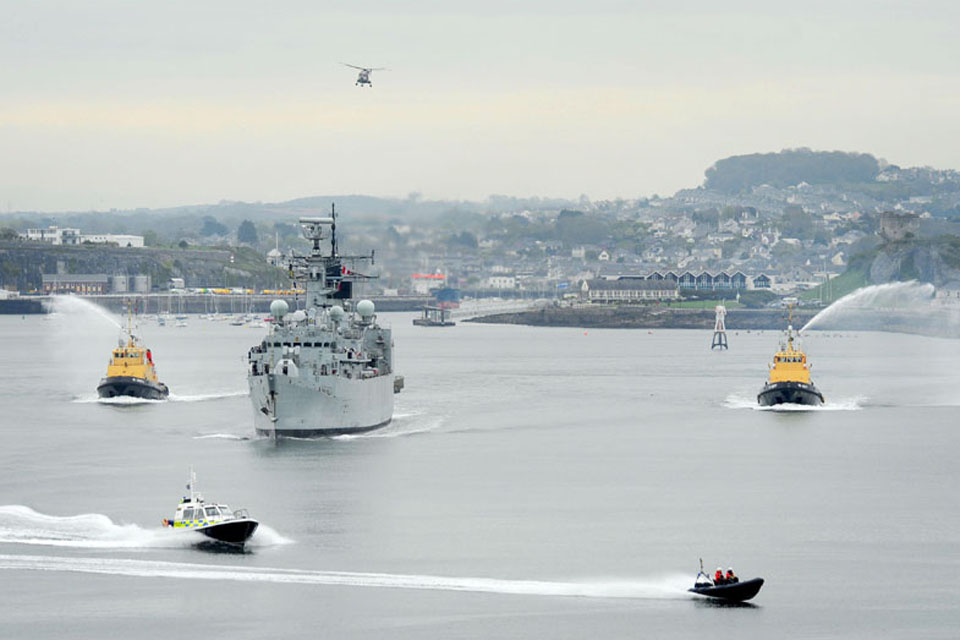HMS Cumberland welcomed home from Libya operations
HMS Cumberland's ship's company received a rapturous welcome home to the UK as she returned from six-and-a-half months of operations, including high-profile roles evacuating refugees from Libya and enforcing an arms embargo against the country.

Families on the quayside in Plymouth to welcome home HMS Cumberland [Picture: Crown Copyright/MOD 2011]
The Type 22 frigate was welcomed by around 1,000 family and friends of the crew as she made her final entry into its base-port of Her Majesty’s Naval Base Devonport from an intense and successful patrol involving oil production protection in the Gulf, counter-piracy operations, evacuating refugees from Libya and enforcing an arms embargo against the country’s ruler.
Families waving banners and entertained by the Band of Her Majesty’s Royal Marines, Plymouth, crowded onto the jetty for the long-awaited sight of their loved ones after six-and-a-half months deployed from the UK - one month later than planned due to events in Libya.
HMS Cumberland is due to be decommissioned later this summer.
Captain Steve Dainton, the ship’s commanding officer, praised his crew:
My ship’s company have been thoroughly professional in everything they have been tasked to do. I am very proud of them and I want them to be proud of themselves and to tell the world about what we have achieved together.
HMS Cumberland sailed from Devonport on a misty morning on 30 September last year on a pre-planned counter-piracy and maritime policing patrol which culminated in the ship being tasked at short notice to Libya as fast-moving events there demanded the Royal Navy be called upon to evacuate British and other nationals from the port city of Benghazi and to enforce UN sanctions against Libya.
Capt Dainton said:
My team have proved themselves utterly professional in everything we have been involved in, during the most varied deployment I have ever known. They have shown how flexible, brave well trained and compassionate they are. It is all I expected of them and I could not have had any more loyalty and commitment more from them.
The ship’s final entry was also marked by a fly-past of the ship’s helicopter and a gun salute from one of the ship’s guns as it passed Plymouth Hoe with well-wishers waving from the shore.

HMS Cumberland returns to Her Majesty's Naval Base Devonport [Picture: Crown Copyright/MOD 2011]
Captain Dainton said:
This is a day of excitement to mark the end of a successful deployment and for everyone to be reunited with their families. But it is tinged with sadness because this is the final time the ship with an illustrious past will fly the White Ensign sailing into her base-port. I must admit it is an emotional time for me as well, because this will be my last of three ship commands and it means lot to me as well.
During three emergency visits to Libya’s troubled second city HMS Cumberland evacuated 454 people, including 129 British citizens. The warship was the first and last Royal Navy warship into Benghazi and Britain’s biggest contributor to the evacuation.
During the first evacuation the weather was so terrible and conditions so rough that many of the evacuees, some ill any way were seasick. The ship’s medical officer, Surgeon Lieutenant Alex Shaw and his team worked round the clock to ensure they were properly cared for. Many members of the ship’s company entertained children and changed nappies because the children’s parents were too ill to do so themselves. After the first evacuation was completed in Malta, HMS Cumberland restored, refuelled and sailed again within seven hours of arrival.
As the crisis in Libya developed HMS Cumberland tasking was extended further to help enforce the UN Security Council Resolutions 1970/1973, enforcing the arms embargo and deterring Gaddafi’s naval forces from joining in attacks on civilians.
HMS Cumberland was part of the NATO-led maritime force of 19 ships from across the Alliance enforcing the embargo. She handed over her responsibilities today to HMS Liverpool, and is now heading west towards Gibraltar.
HMS Cumberland’s successful patrol was otherwise all taken up with the following achievements:
- Conducted counter-piracy patrols in the Gulfs of Aden and Oman
- Guarded the Iraqi Al Basra Oil Platform in the Northern Arabian Gulf
- Taken part in Exercise AIR KHANDJAR with the United Arab Emirates’ Navy and Air Force, as well as other exercises with the Saudi Arabian Navy
- Patrolled the Central and Southern Arabian Gulf securing sea lanes and deterring smugglers and maritime crime
- Made eight transits of the vital Straits of Hormuz between Oman and Iran, all the while escorting high value shipping or other military units
- Provided support to French Aircraft Carrier Charles De Gaulle while she conducted combat air operations into Afghanistan over Christmas
- Supported the state visit of Her Majesty the Queen’s visit to Abu Dhabi in Nov 10
- Hosted the new Ruler of Ras Al Khaimah, Sheikh Saud bin Saqr in the first such visit since his accession.
The ship is due to be decommissioned under the Strategic Defence and Security Review, with a decommissioning ceremony on 23 June. She is the 16th ship of the Royal Navy to bear the name Cumberland, with the name first used in 1695.